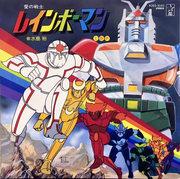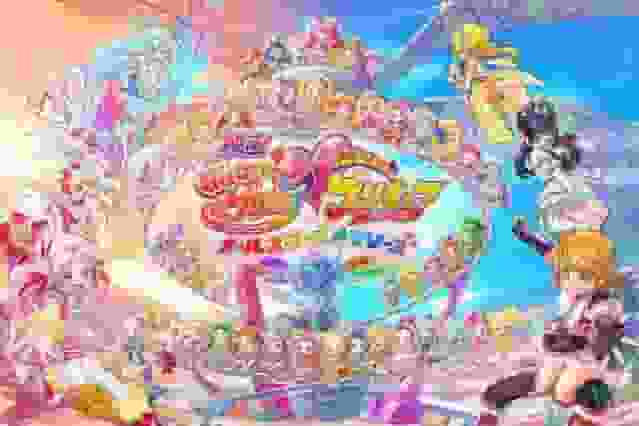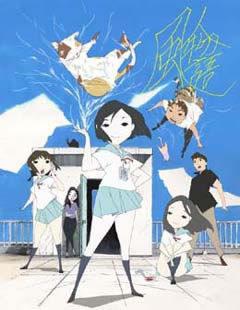Rainbowman, the warrior of love: A thorough analysis of the touching story and the appeal of its characters

Rainbowman, the warrior of love: The appeal and background of the 80s superhero animeIntroduction"Rainbowman, the Warrior of Love," which aired from 1982 to 1983, is a work that evolved from a special effects drama to animation, and can be said to be a symbol of hero anime in the 1980s. In this article, we will take a detailed look at the appeal and background of Rainbowman, as well as its evaluation and recommendations. Overview
story■ StoryThe evil secret organization, Die Die Dan, is plotting to invade the Earth using Devil Mecha. Yamato Takeshi, who trained under the saint, Devadatta, and gained the power to become Rainbowman, fights alongside his friends. Commentary■Explanation This is an animated version of the 1972 special effects drama "Rainbowman, the Warrior of Love." It started out as a double feature with "Super Dimension Fortress Macross" (produced by Tatsunoko Productions) in the "Sunday Anime Present" time slot. It was produced as a hero action anime, with a different feel from the live-action version, changing the design of Rainbowman and introducing a giant robot. cast■Cast・Yamato Takeshi, Rainbowman / Mizushima Yutaka・Yamato Akiko / Muto Reiko・Yamato Jun / Nomura Hiroko・Omiya Yoko / Tsuru Hiromi・Dr. Omiya / Kishino Kazuhiko・Divadatta / Chiba Koichi・Mr. K / Kuwahara Takeshi・Emperor Dongoros / Iizuka Shozo Main Staff■ Main staff・Original story by Yasunori Kawauchi・Producer: Osamu Hirooka・General director: Nobuhiro Okasako・Screenplay: Tsunehisa Ito・Director: Yoshihito Hata, Kazuhiro Ochi・Chief animation directors: Nobuhiro Okasako, Seiji Yamashita, Arata Fukuda, Kazuhiro Ochi・Art director: Masaru Tensui (also known as Katsumi Hando in other documents) Main Characters■ Main Characters Yamato Takeshi High School wrestling champion. With the power of Devadatta, he is reborn as Rainbowman and fights the Die Die Corps with the power of the seven incarnations. Main Robot Items■ Main robot itemsRainbow Seven: A giant mecha born when Rainbowman, who has split into seven incarnations, combines with a robot called "V Armor" created by Professor Omiya. He can use the techniques of all seven incarnations. His techniques include the Rainbow Sword, a sword of light, the Rainbow Barrier to protect people, and the Big Cross, a destructive ray that he fires by transforming himself into a giant cross. subtitle■Subtitle Episode 1: A Fateful Encounter (10/10/1982) Theme songs and music■ Theme songs and music・OP1 Appeal of the work"Rainbowman, Warrior of Love" made a huge leap in its visual expressiveness by transitioning from a special effects drama to animation. In particular, the designs of Rainbowman's seven incarnations and the giant robot Rainbow Seven made a strong impression on children at the time. The story also unfolded in a more dynamic and speedy way, unlike special effects dramas. This allowed viewers to enjoy a new world of Rainbowman. Character AppealThe main character, Yamato Takeshi, begins as a wrestling champion, trains under Devadatta, and the process of transforming into Rainbowman is depicted. This coming-of-age story resonated with viewers, and made them root for Takeshi's battles. In addition, Rainbowman's seven incarnations each have different abilities, creating strategic battle scenes. Furthermore, supporting characters such as Devadatta and Dr. Omiya also added depth to the story and captured the hearts of viewers. The appeal of musicThe opening theme "Rainbowman, Warrior of Love" and the ending theme "His Name is Rainbowman" were written by Yasunori Kawauchi and composed by Jun Kitahara, leaving a strong impression of the worldview of the work. The opening theme in particular is still loved by many fans as an iconic song for hero anime. These songs played a role in elevating the emotions of viewers and deepening their immersion in the story. BackgroundThe anime adaptation of "Rainbowman, the Warrior of Love" was made following the success of the special effects drama. The production team aimed to maintain the fan base of special effects dramas while cultivating a new audience. To that end, they redesigned Rainbowman and incorporated elements that reflected the trends of the time, such as introducing a giant robot. In addition, the high quality of the animation was achieved through a joint production between Mainichi Broadcasting System and Ai Kikaku Center. Ratings and Recommendations"Rainbowman, the Warrior of Love" is highly regarded as a hero anime from the 80s. In particular, the seven incarnations of Rainbowman and the design of the giant robot Rainbow Seven had a strong visual impact and were loved by children. The development of the story and the growth of the characters also deeply moved viewers. The music also left a strong impression on the worldview of the work and played a role in elevating the emotions of the viewers. The reasons why I recommend this work are as follows:
"Rainbowman, the Warrior of Love" is a symbol of hero anime in the 80s, and its charm is still loved by many fans. It is highly recommended not only for fans of special effects dramas, but also for viewers who want to enjoy the evolution of animation and hero stories. Conclusion"Rainbowman, Warrior of Love" is a work that has evolved from a special effects drama to animation, and it fully brings out the charm of hero anime from the 1980s. The seven incarnations of Rainbowman, the giant robot design, the protagonist's growth story, and the appeal of the music all attracted viewers and deeply moved them. This work is highly recommended not only for fans of special effects dramas, but also for viewers who want to enjoy the evolution of animation and hero stories. Be sure to check out "Rainbowman, Warrior of Love," which is still loved by many fans as a symbol of hero anime from the 1980s. |
<<: Maya the Bee: A fascinating story and beautiful visuals
>>: The appeal and reviews of "Boku Patalliro!": The perfect balance of humor and adventure
Recommend
The appeal and reviews of "GR [GIANT ROBO]": A thorough explanation of the giant robot anime masterpiece
The full story and appeal of "GR [GIANT ROBO...
The famous manga "Golden Kamuy" is confirmed to end the 7-year journey to find gold on April 28
Noda SATORU's treasure-hunting adventure work...
Disney animation "Raya and the Last Dragon" new poster Raya and the last dragon
Disney's animated film "Raya and the Las...
"Number 17" CINITY LED version debuts: presenting the best viewing experience for fans
On March 2, the highly anticipated Hollywood sci-...
The handsome sword surrounding the "Alita" movie collection weapon is priced at $499
"Alita: Battle Angel" is about to be re...
Baki: The Most Evil Death Row Convicts Episode 1 Review and Impressions
The appeal and evaluation of "Baki" Mos...
Review of "Tenkuu Daimakyo": A fascinating world view and a profound story
"Tenkuu Daimakyo": A grand story that t...
"Kagi-nado Season 2" review: Beyond expectations and deeper characters
"Kagi-nado Season 2" - A short animated...
The live-action movie "The Little Mermaid" released a new trailer on May 26
Disney released the latest trailer for the live-a...
Photos of the live-action version of "Mulan" are revealed, and Disney's casting is great this time
"Mulan" is a famous Chinese folk tale. ...
Phi Brain: The appeal and evaluation of God's Puzzle Season 2: A new challenge for puzzles
Phi Brain God's Puzzle [2nd Season] - Detaile...
Director says DC has no interest in making new Wonder Woman movie
The film "Star Wars: Rogue Squadron" wa...
'Stranger Things' creators are developing a new supernatural Netflix series
A new supernatural suspense series from the Duffe...
Rohan Kishibe: The Confessional, The Run - A fascinating story and character development
A comprehensive review and recommendation of &quo...
The Testament of Sister New Devil review: A fascinating story and deep character exploration
The Testament of Sister New Devil - Shinmai Maou ...









